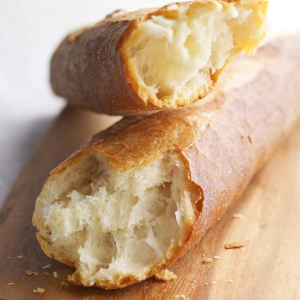Once in a while, something so poignant comes up that I just have to post on it. Today, it’s a little piece of history about why the French never place a loaf of bread upside down on the table. Especially a baguette. That’s especially spooky…

There’s a longstanding rule in French bakeries. One that has spread to French homes and eateries over the years, and persists in spite of our cosmopolitan 21st Century outlook on life. Other superstitions have largely gone by the wayside with the ascendance of the Millennials and the Gen Xs, Ys and Zs. But everyone in France knows it’s the pinnacle of bad luck to place a loaf of bread upside down on a table or counter.
And this creepy tale is just one of many food-related superstitions…
A little history…
The Baguette Curse
The story begins back in the time of the French Revolution. As some versions go, the Guillotine master had an understandably busy schedule. So he was allowed to jump the line at the bakery when grabbing his daily baguette, and get on with his business.
To make it clear which loaf was a reserved for the executioner, the baker placed it upside down on the rack.
To take it for yourself, or even touch it was, and still is considered not only bad form, but very bad luck. And if you accidentally came into contact with an inverted baguette, you had to make the sign of the cross on it with your finger before eating it to cancel the curse.
Garlic wards off vampires
Sine we all know vampires are mythical, we’ll never know if the hundreds-of-years-old belief is true. But there are those wags who will say, when challenged on it, that if you haven’t every encountered a vampire and like french food, that show’s it’s working!
Garlic has also, through the centuries, been said to ward off ghosts, evil spirits and werewolves. Though there is stronger evidence that it’s silver – as in a bullet or a crucifix – that tames the dreaded lycanthrope. But since most of us have never encountered a werewolf…
Long noodles symbolize long life
It’s a core Asian New Year’s tradition: You must eat some long noodles – the longest you can find – to ensure health during the coming year, and a long life thereafter. Millions of Asians – especially Chinese – make sure to have at least one meal of Yi Mein or E-Fu noodles during Lunar New Year’s Week.
They also make sure to eat dumplings and spring rolls at New Year’s to ensure prosperity.
Throwing rice at weddings
Rice is an ancient symbol of plenty and fertility. That’s why folks traditionally used to throw dry, uncooked rice at the bride and groom as they left the church after their wedding ceremony. That evolved into flower petals, and then confetti.
But in the past couple of decades or so, many churches have banned confetti, which is a pain to clean up. And encouraged well wishers to go back to throwing rice, which is biodegradable, and can simply be swept off the church steps into the bushes.
Don’t hand a hot pepper directly to a friend
There’s an old superstition that it’s bad luck to hand a hot chili pepper directly to a friend. It’s believed that this will lead to disagreements and even feuds between giver and receiver. That’s is a particular worry for folks in a restaurant kitchen environment who have to maintain good relations with their co-workers.
As a result, many cooks always make sure to place a hot pepper on the counter or table top and let the other party pick it up from there.
My take
Yes, these are all just superstitions. But an amazing number of folks, especially the older set and folks from ancient European and Asian cultures, have entrenched cultural memories of them. And the proverbial ‘old wives’ have done their jobs well, passing them down the generations.
And they do, in their harmless way, make life richer and more colourful for those who follow them!
~Maggie J.

